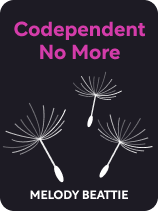

This article is an excerpt from the Shortform book guide to "Codependent No More" by Melody Beattie. Shortform has the world's best summaries and analyses of books you should be reading.
Like this article? Sign up for a free trial here .
What is self-care, and why is it important? What does detachment have to do with self-care?
There are many different definitions of self-care, but the one we will be exploring is the one described by Melody Beattie in her book Codependent No More. Beattie believes that practicing self-care is one of the most important steps in overcoming codependency.
Continue below for insights on self-care and how it relates to codependency.
What Is Self-Care?
What is self-care, and why is it important? Beattie believes that self-care is living a responsible life: knowing you are important and taking responsibility for yourself. You do this by being mindful of your needs, wants, emotions, and responsibilities toward yourself and others.
Beattie warns that people can abuse the concept of self-care. People might claim to take care of themselves when avoiding, escalating, or causing problems. For example, if you take time off work without notice because you want to sleep in, you’re not practicing self-care—you’re neglecting a responsibility and leaving your coworkers in the lurch.
Beattie explains that fulfilling your responsibilities is a tricky aspect of self-care for a codependent because you have the tendency to place too much responsibility on yourself. Before accepting a responsibility, ask yourself if it truly is your duty. One helpful question to keep in mind is whether your actions respect both your and the other person’s right to choose. For example, by taking off work without notice, you’re not respecting your boss’s right to choose a replacement for the day, and you’re forcing your coworkers into a stressful and overworked position.
| Is That Really What Self-Care Means? Beattie’s definition of self-care might surprise some people. When many people think of self-care, they picture spa days and expensive purchases rather than personal responsibility. However, Beattie’s definition is bolstered by the American Psychological Association and the National Institute of Health: Both agree that true self-care is being mindful of your physical and mental needs. The popular misunderstandings of self-care are often caused by taking the real principles of self-care too far. For example, some people misconstrue the need to care for their physical health, pushing themselves beyond their limits in the hopes of attaining a certain body type. Others take the need for relaxation too far and ignore their responsibilities in favor of lazing about and making unwise purchases. Beattie’s inclusion of responsibility to others as well as yourself in her definition of self-care helps combat these tendencies: Responsibility toward yourself keeps you from overworking yourself, and responsibility toward others prevents you from neglecting all your duties. |
| Accepting That You’re Important Enough for Self-Care It is difficult for codependents to accept that they are important and that caring for themselves needs to be a priority. In 12 Rules for Life, Jordan Peterson suggests combatting this tendency by believing that you have an important job that you are alive to complete. If you hold this belief, treating yourself well becomes a moral obligation. Peterson also suggests using others as a reason for treating yourself well: for example, saying, “Not taking care of myself will hurt the people around me, so I will take care of myself.” This may be good advice for the general person suffering from low self-esteem, but it’s dangerous for codependents who already pin too much of their value on other people. Instead of rooting your reasons for self-care in other people, do it because you deserve good things simply by being you. Your important job is to be yourself and live happily and healthily. You can encourage this kind of thinking by challenging your negative self-talk with evidence (for instance, “I’m not lazy, I’ve been working hard every day and completed XYZ.”), turning negative comments about yourself into something positive (for example, turning “I’m so slow” into “I’m careful and diligent.”), and improving your physical health, because the better you feel physically, the better you’ll feel mentally. |
How Does Detachment Factor Into Self-Care?
According to Beattie, detachment is the underlying principle of recovering from codependency. It means pulling back from the person you’ve attached to and refocusing your energy on yourself. Instead of focusing on caring for the other person, you’re caring for yourself first. In this way, you’re practicing self-care.
Beattie stresses that detachment doesn’t mean abandoning the other person or being cruel: It means not allowing them to control you. You’re taking responsibility for yourself and letting others be responsible for themselves. Detaching yourself can also force others to take responsibility for themselves and improve their lives. In the end, having a healthy relationship will benefit both you and the other person, even if it’s painful or uncomfortable at first.
If possible, Beattie advises that you should detach with kindness and care for the other person. If necessary, though, anger is a powerful motivator. Detaching in anger is more painful, but it will give you the space to work through the problem and your emotions. This doesn’t mean that detachment happens all at once, though: Even if you initially detach in anger, you have to continue practicing it every day.
| Non-Attachment and Compassion: How Buddhist Teachings Can Fight Codependency Beattie’s understanding of detachment shares many characteristics with the Buddhist belief of non-attachment. Non-attachment revolves around getting rid of unhealthy attachments: You can have nice things and relationships as long as you don’t let those things control you. The Buddhist methods of non-attachment are very similar to Beattie’s recommendations, which we’ll discuss in the next section. However, Buddhism emphasizes recognizing impermanence, which Beattie doesn’t. Buddhism stresses that you have to let go of objects, goals, and relationships once their time has passed. You can tell that something’s time has passed when it starts holding you back instead of helping you. Non-attachment is freedom, so if something makes you feel trapped or controlled, it’s time to let it go. Beattie’s recommendation to detach in kindness and care unless necessary also mirrors Buddhist teachings. The Buddhist teaching on compassion specifies that you should remain nonviolent, but that sometimes, a situation calls for a forceful response. In those cases, it wouldn’t be compassionate to stand by and watch the situation get worse in the hopes of remaining nonviolent. In the case of codependency, it wouldn’t be healthy or kind to remain attached to the other person, because in doing so, you’re preventing the other person from taking responsibility for their own life. You couldn’t resolve the situation through kindness and care, so the responsible act is to detach forcefully in anger. |

———End of Preview———
Like what you just read? Read the rest of the world's best book summary and analysis of Melody Beattie's "Codependent No More" at Shortform .
Here's what you'll find in our full Codependent No More summary :
- What inspired codependency 12 Step Programs around the country
- Explanations, advice, and compassion for people struggling with codependency
- How to practice detachment, self-care, and personal responsibility






